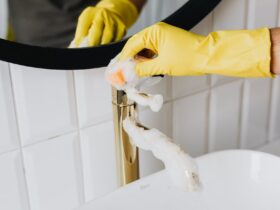To clean pool tiles, use a mixture of water and white vinegar or a pool tile cleaner. Gently scrub the tiles with a soft brush to remove any dirt or grime buildup.
A sparkling clean pool not only enhances the visual appeal of your backyard oasis but also ensures a hygienic swimming environment for you and your family. Over time, pool tiles can accumulate dirt, grime, and mineral deposits, detracting from the overall aesthetic.
Fortunately, with the right approach, cleaning pool tiles can be a straightforward task. By following the appropriate techniques and using suitable cleaning agents, you can restore the luster of your pool tiles, making them look as good as new. We will explore effective methods for cleaning pool tiles, ensuring that your pool area remains inviting and pristine.
Introduction To Pool Tile Cleaning
Learn the best techniques for pool tile cleaning to keep your pool sparkling and free from grime. Use a gentle brush and a mixture of baking soda and water to scrub the tiles effectively. Regular maintenance will ensure a pristine pool for endless summer enjoyment.
Welcome to our comprehensive guide on pool tile cleaning. Maintaining clean and sparkling pool tiles is essential for both the aesthetic appeal of your pool and the longevity of the tiles. Over time, pool tiles can accumulate dirt, grime, and even stubborn mineral deposits that can be challenging to remove. In this article, we will discuss the importance of regular maintenance, safety precautions you should take before starting, and provide you with effective tips and techniques to ensure your pool tiles remain clean and beautiful.
Importance Of Regular Maintenance
Regular maintenance of your pool tiles is crucial to prevent the buildup of dirt, algae, and mineral deposits. Neglecting proper cleaning can lead to unsightly stains, reduced water quality, and potential damage to the tiles. By incorporating a regular cleaning routine, you can prolong the life of your pool tiles, maintain a hygienic swimming environment, and enhance the overall appearance of your pool.
Safety Precautions Before Starting
Before diving into the pool tile cleaning process, it’s important to take necessary safety precautions to protect yourself and the pool. Here are some key safety measures to consider:
- Ensure you are wearing appropriate protective gear, such as goggles, gloves, and non-slip footwear, to safeguard yourself during the cleaning process.
- Before starting, make sure the pool’s filtration system is turned off to avoid any accidents or damage to the equipment.
- Check the pool’s chemical balance and adjust it if needed. Proper chemical levels are vital to prevent any adverse reactions when cleaning the tiles.
- Keep all cleaning solutions and tools out of reach of children and pets to prevent any accidental ingestion or injuries.
- If using any cleaning chemicals, carefully follow the manufacturer’s instructions and dilute them as recommended to avoid any potential harm.
By following these safety precautions, you can ensure a safe and hassle-free pool tile cleaning process.
Now that we have covered the importance of regular maintenance and necessary safety precautions, let’s delve into effective tips and techniques for cleaning your pool tiles. Stay tuned for our upcoming blog post!
Identifying Your Pool Tile Type
To effectively clean your pool tiles, start by identifying the tile type to select the proper cleaning method. Different materials like ceramic, glass, or stone require specific cleaners to maintain their quality and appearance. Understanding your pool tile type ensures a successful cleaning process.
Cleaning your pool tiles is an essential part of pool maintenance. However, before you start cleaning, it is important to identify the type of pool tiles you have. Each tile material requires a different cleaning method, and using the wrong method could result in damage to your tiles. In this section, we will discuss the common materials used for pool tiles and how to care for them.
Common Materials And Their Care
| Tile Material | Cleaning Method | Care Tips |
|---|---|---|
| Ceramic | Use a non-abrasive cleaner and a soft-bristled brush. Avoid using acidic cleaners or abrasive materials. | Regular cleaning is essential to prevent build-up. Avoid using metal tools or harsh chemicals. |
| Glass | Use a non-abrasive cleaner and a soft-bristled brush. Avoid using acidic cleaners or abrasive materials. | Regular cleaning is essential to prevent build-up. Avoid using metal tools or harsh chemicals. |
| Stone | Use a pH-neutral cleaner and a soft-bristled brush. Avoid using acidic cleaners or abrasive materials. | Seal your tiles regularly to prevent staining and damage. Avoid using metal tools or harsh chemicals. |
Impact Of Tile Type On Cleaning Methods
The type of tile you have will impact the cleaning method you use. For example, ceramic and glass tiles are more delicate than stone tiles and require a gentler approach. Stone tiles are more porous and can be stained easily, so a pH-neutral cleaner is necessary. Using the wrong cleaning method can damage your tiles and result in costly repairs.
In conclusion, identifying your pool tile type is crucial before you start cleaning. By knowing the common materials and their care tips, and the impact of tile type on cleaning methods, you can ensure that your pool tiles stay clean and in good condition for years to come.
Pre-cleaning Preparations
Prepare for pool tile cleaning by gathering a scrub brush, mild detergent, and a bucket. Fill the bucket with warm water and detergent for effective tile scrubbing. Proper pre-cleaning preparations ensure a successful and efficient pool tile cleaning process.
Before you start cleaning your pool tiles, it’s important to make a few preparations. These steps will help ensure that the cleaning process goes smoothly and effectively. Follow the instructions below to get your pool ready for a thorough tile cleaning.
Lowering Water Levels
To make cleaning your pool tiles easier, it’s recommended to lower the water levels. This will expose a larger portion of the tiles, making it easier to reach and clean them. Here’s how you can do it:
- Turn off the pool pump to prevent any water from flowing into the pool during the process.
- Attach a hose to a submersible pump and place it in the pool.
- Position the other end of the hose in an area where the water can be safely drained.
- Turn on the pump and let it drain the water from the pool until the desired level is reached.
- Monitor the water level closely to avoid draining too much water.
Gathering Essential Cleaning Supplies
Before you begin cleaning your pool tiles, it’s important to gather all the necessary supplies. Having everything ready will save you time and make the cleaning process more efficient. Here’s a list of essential cleaning supplies you’ll need:
| Supplies | Description |
|---|---|
| Tile brush or scrubber | A brush or scrubber specifically designed for pool tiles will help remove stubborn dirt and grime. |
| Pumice stone | A pumice stone can be used to gently scrub away tough stains on the tiles. |
| Tiles cleaner | Choose a pool tile cleaner that is safe and effective for your specific type of tiles. |
| Protective gloves | Wearing gloves will protect your hands from any harsh chemicals in the cleaning solution. |
| Bucket | A bucket will come in handy for mixing the cleaning solution and carrying water for rinsing. |
| Clean cloth or sponge | A soft cloth or sponge can be used to wipe away excess water and cleaning solution. |
Having these supplies ready will ensure that you have everything you need to clean your pool tiles effectively.
Manual Cleaning Techniques
When it comes to cleaning pool tiles, manual techniques can be highly effective in removing dirt, grime, and stains. Manual cleaning methods offer a hands-on approach to maintaining the beauty and cleanliness of your pool tiles. In this section, we will explore the scrubbing and brushing basics, as well as the use of pumice stones for stubborn stains.
Scrubbing And Brushing Basics
Scrubbing and brushing are fundamental manual cleaning techniques for pool tiles. Start by scrubbing the tiles using a soft-bristled brush and a mild detergent solution. This gentle scrubbing action helps to loosen and remove surface dirt and debris. Follow this up with brushing to further dislodge any remaining particles and to ensure a thorough clean.
Using Pumice Stones For Stubborn Stains
Pumice stones are excellent for tackling stubborn stains on pool tiles. When encountering tough mineral deposits or calcium build-up, gently rub the pumice stone over the affected areas. The abrasive nature of the pumice stone helps to lift and remove these stubborn stains without causing damage to the tile surface. Always ensure the tiles and the pumice stone are wet during this process to prevent scratching.
Chemical Cleaning Solutions
Chemical cleaning solutions are an effective way to remove stubborn stains and buildup from pool tiles. When used correctly, these solutions can restore the appearance of your pool tiles and keep them looking fresh and clean. In this section, we will explore the key considerations for selecting the right chemicals and provide application tips for optimal results.
Selecting The Right Chemicals
It’s crucial to choose the appropriate chemical cleaning solution based on the type of stains and the material of your pool tiles. Acidic cleaners are suitable for calcium deposits and mineral buildup, while alkaline cleaners work best for grease and organic stains. Always read the product labels and ensure that the chosen chemicals are safe for your specific pool tile material.
Application Tips For Optimal Results
When applying chemical cleaning solutions, it’s essential to follow the manufacturer’s instructions carefully. Begin by pre-wetting the tiles to prevent the chemicals from being absorbed too quickly. Apply the solution using a sprayer or sponge, working in small sections to ensure thorough coverage. After the recommended dwell time, scrub the tiles gently with a soft-bristled brush to dislodge the stains. Finally, thoroughly rinse the tiles with water to remove any residue.
:max_bytes(150000):strip_icc()/best-way-clean-tile-pool-waterline-2736539-06-9d3c31b7277d4763a12fc1f2e7691967.jpg)
Credit: www.thespruce.com
Advanced Cleaning Methods
When it comes to cleaning pool tiles, sometimes basic methods just won’t cut it. That’s where advanced cleaning methods come into play. These techniques go beyond the surface level, ensuring a deep and thorough clean that will leave your pool tiles looking brand new. In this section, we will explore two effective methods for advanced pool tile cleaning: pressure washing and hiring professional pool cleaners.
Pressure Washing For Deep Clean
If you’re dealing with stubborn stains or built-up grime on your pool tiles, pressure washing is an excellent option. This method involves using high-pressure water jets to remove dirt and debris from the tiles’ surface and grout lines. It is a powerful and efficient way to deep clean your pool tiles, restoring their original shine and luster.
Here’s how you can effectively use pressure washing to clean your pool tiles:
- Prepare the area: Before you begin pressure washing, remove any loose debris or objects from the pool area to avoid potential damage.
- Adjust the pressure: Set the pressure washer to a suitable level, ensuring it is not too high that it damages the tiles or too low that it is ineffective.
- Start from the top: Begin pressure washing from the top of the tiles and work your way down, using steady and even strokes.
- Pay attention to grout lines: Direct the water jet towards the grout lines to remove any dirt or stains that may be trapped there.
- Rinse thoroughly: Once you have finished pressure washing, rinse the tiles thoroughly with clean water to remove any remaining dirt or detergent.
Hiring Professional Pool Cleaners
If you prefer to leave the task of pool tile cleaning to the experts, hiring professional pool cleaners is a wise choice. These professionals have the knowledge, experience, and specialized equipment to tackle even the toughest pool tile cleaning jobs.
Here are the benefits of hiring professional pool cleaners:
- Expertise: Professional pool cleaners are trained in the best techniques and methods for cleaning pool tiles, ensuring a thorough and effective cleaning process.
- Time-saving: By delegating the task to professionals, you can save valuable time and focus on other important aspects of maintaining your pool.
- Quality results: Professional cleaners have access to high-quality cleaning products and equipment, resulting in superior and long-lasting results.
- Prevention of damage: Improper cleaning techniques or the use of harsh chemicals can damage your pool tiles. Professional cleaners know how to handle different tile materials and ensure their preservation.
When it comes to advanced pool tile cleaning, pressure washing and hiring professional pool cleaners are two effective methods that can help you achieve a deep and thorough clean. Choose the method that suits your needs and preferences, and enjoy sparkling clean pool tiles that enhance the overall beauty of your pool.
Frequently Asked Questions
How To Prevent Pool Tile Buildup?
To prevent pool tile buildup, regularly scrub tiles with a non-abrasive cleaner and brush to maintain cleanliness.
What Is The Best Cleaner For Pool Tiles?
The best cleaner for pool tiles is a non-abrasive, pH-balanced tile cleaner recommended by pool professionals.
Can Vinegar Clean Pool Tiles Effectively?
Yes, vinegar can effectively clean pool tiles due to its acidic properties that help dissolve stubborn stains.
Is It Safe To Use Bleach On Pool Tiles?
It is safe to use a diluted bleach solution on pool tiles for tough stains, but ensure proper ventilation.
How Often Should Pool Tiles Be Cleaned?
Pool tiles should be cleaned weekly to prevent buildup and maintain a sparkling, inviting pool area.
What Tools Are Best For Cleaning Pool Tiles?
Soft-bristled brushes, non-abrasive scrubbers, and pool-safe tile cleaners are the best tools for cleaning pool tiles effectively.
Conclusion
After reading this guide on how to clean pool tiles, you should be equipped with the necessary knowledge and tools to keep your pool looking sparkling clean. Remember to regularly scrub your tiles with a soft-bristled brush and use the appropriate cleaning solution based on your tile material.
Additionally, incorporating routine maintenance and cleaning into your pool care routine will not only keep your pool looking great but also prolong the life of your pool tiles. Happy cleaning!










Leave a Reply